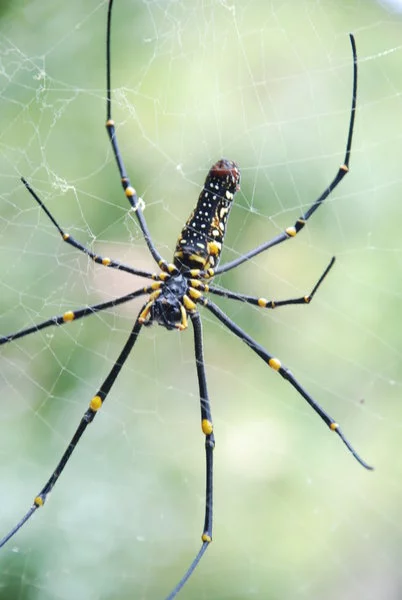Ants. What a pest. Once you get them in your house it can be a real mission to get rid of them. But it seems the Golden orb web spider has developed a way to keep its home clear of the little buggers. The secret uncovered by researchers from the National University of Singapore (NUS) and the University of Melbourne relates to a chemical compound the spider adds to its web that appears to repel ants. So not only are spider webs providing inspiration for better adhesives and stronger materials, they may also provide the basis for new, environmentally friendly, ant-repelling pesticides.
Golden orb web spiders are already in high demand amongst researchers due to the strength of their webs. The silk of this particular spider is almost as strong as Kevlar, and only a fraction of the weight. But NUS Associate Professor Daiqin Li was more interested in the possible ant-repelling nature of the spider's web after noting that, although ants were ever abundant near the webs of the orb web spiders, they don't typically end up trapped in the webs.
After observing spun webs and analyzing the compounds in the silk, the scientists soon discovered the mystery substance, which was later determined to be an alkaloid compound. Once discovered, scientists observed ants in the presence of the compound and discovered that they displayed evasive behavior whenever they came near the alkaloid.
"We found that large Golden orb web spiders add a defensive alkaloid chemical onto the silk, which stops the ants from walking onto the web when they come into contact with it," said Diaqin Li of Biological Sciences, NUS.
"The type of chemical deterrent found in the spider silk is known as a pyrrolidine alkaloid, which acts as a predator deterrent in many species of ants, moths and caterpillars," added Professor Mark Elgar from the University of Melbourne's Department of Zoology. "The orb spider is potentially vulnerable to attack from groups of ants while sitting in its web waiting for prey, so the chemical defense in web silk may have evolved to not only protect the spider, but to reduce the time and energy that would otherwise be required to chase away invading ants."
The discovery offers the prospect of the development of a pesticide for keeping ants away from where they aren't wanted.
The NUS and University of Melbourne team's paper appears in the journal Proceedings of the Royal Society B.










